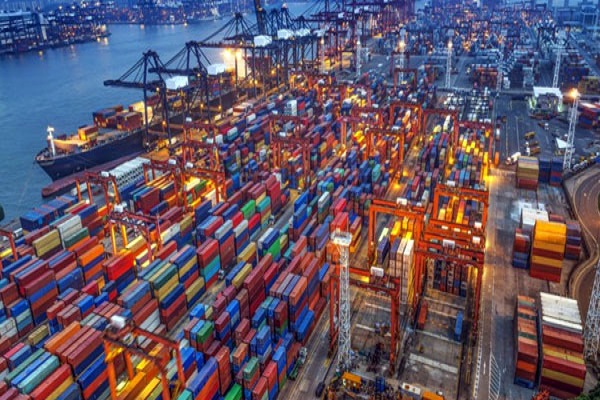
Pakistan ports face export backlog as India’s transit ban forces shipping lines to reroute
ISLAMABAD : Pakistan is facing a “big backlog” of export containers at its ports after international shipping lines began bypassing the country, following India’s decision to block vessels carrying Pakistani cargo, officials and shipping documents confirmed to Arab News on Friday.
The disruption has led several global shipping companies to impose emergency operational surcharges on Pakistani cargo, citing the “significant impact” of regional geopolitical tensions on their operations.
The move is expected to raise shipping costs and, ultimately, consumer prices in Pakistan, a country of over 240 million people already grappling with economic challenges.
“The European shipping services are bypassing Pakistan ports after India’s ban on the transit of ships loaded with cargoes from Pakistan,” said Syed Tahir Hussain, Secretary General of the Pakistan Ship Agents Association (PSAA).
He accused New Delhi of attempting to undermine Pakistan’s recovering economy, which has shown signs of stabilization under the International Monetary Fund’s (IMF) $7 billion loan program.
PSAA Chairman Mohammed A. Rajpar called India’s move “unwarranted” and against international conventions, saying it was designed to discourage shipping lines from calling at Pakistani ports.
The situation comes as Islamabad is attempting to break free from its boom-and-bust economic cycles by boosting exports, which rose 6 percent to $27 billion through April, according to the Pakistan Bureau of Statistics.
Until recently, many international shipping services transited Pakistani cargo through India’s largest ports — Mundra and Nhava Sheva — by loading what is termed Remaining On Board (ROB) freight.
However, India embargoed this practice last week, prompting several carriers to remove Pakistani ports from their routes and instead launch dedicated feeder services to handle trade valued at approximately $87 billion last year.
Most of Pakistan’s containerized cargo is handled through the South Asia Pakistan Terminal (SAPT) operated by CH Hutchison Holdings, Qasim International Container Terminal (QICT) run by DP World and the Karachi Gateway Terminal managed by Abu Dhabi Ports Group.
“Some vessels carrying Pakistan’s exports sailed from QICT were not allowed berthing in India,” said Hussain, whose association represents over 50 international shipping lines.
“They had to divert to Dubai and other nearby ports,” he added, without specifying when the incident occurred.
Shipping documents seen by Arab News show that at least four vessels were denied entry by Indian authorities earlier this week due to “Karachi onboard cargo.” These ships were rerouted to Colombo in Sri Lanka and Jebel Ali in the United Arab Emirates.
Swiss carrier MSC Mediterranean Shipping redirected all destination cargo via Colombo aboard its vessel MSC Positano V-JP526R, which had been scheduled to call at QICT on May 6.
This change, MSC said in a customer notice, was “due to the current geopolitical situation and restrictions on imports and exports via/from India.”
French shipping giant CMA CGM has removed Karachi from at least four of its service routes, citing the need to adjust operations to and from Pakistan.
“BIG BACKLOG” AT PORTS
Export congestion is building at Pakistani ports as hundreds of containers await shipment.
“There is big backlog,” said Khurram Mukhtar, Patron-in-Chief of the Pakistan Textile Exporters Association (PTEA).
Textiles remain Pakistan’s largest export sector, contributing $17 billion last year.
Mukhtar noted that most shipping lines were now planning to route exports through Colombo, with system updates expected by Monday.
MSC has launched a “Pakistan-Colombo Shuttle Service,” a weekly feeder vessel that will transport export containers to Sri Lanka for onward connections to global destinations.
Amid the ongoing crisis, international shipping lines have begun imposing surcharges on Pakistani exporters and importers.
CMA CGM has introduced an Emergency Operational Recovery Surcharge (EORS) of up to $800 per container for shipments to the US, Latin America and Australia, effective from May 15 through June 6.
The French firm said the surcharge was necessary to maintain service reliability and safety during this period. CMA CGM operates more than 250 routes globally with a fleet of 650 vessels.
“Pakistan’s exports are suffering,” said a senior official at one of Pakistan’s major container terminals, speaking on condition of anonymity.
“This will lead to the buildup of a huge container backlog at Pakistani ports,” the official said. “There will be issues like port demurrages. The shipping lines will be charging the consignees with detentions.”
Source: Arab News

